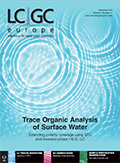43rd International Symposium on Capillary Chromatography and 16th GC×GC Symposium
The 43rd International Symposium on Capillary Chromatography (ISCC) and the 16th GC×GC Symposium will return to Fort Worth, Texas, USA,-the “Gateway to the West”-in 2019.
Photo Credit: Christopher Boswell/Stock.adobe.com

The 43rd International Symposium on Capillary Chromatography (ISCC) and the 16th GC×GC Symposium will return to Fort Worth, Texas, USA,-the “Gateway to the West”-in 2019. After successful 2015 and 2017 conferences, including significant growth in participant and vendor attendance, ISCC and GC×GC will again be held at the historic Hilton Fort Worth from 12–17 May 2019. Registration opens and abstract submissions for oral and poster session contributions will be accepted for consideration from 1 December 2018. The deadline for applications to win one of a wide variety of sponsored travel grant awards is 1 February 2019.
The U.S. counterpart to the highly acclaimed biannual Riva del Garda (Italy) conferences, ISCC and GC×GC are leading symposia for pressure and electrodriven microcolumn separations, comprehensive multidimensional chromatography, and related techniques. These joint meetings provide a rich forum for fundamentals and applications of widely used analytical technologies. These are important symposia to attend to learn the newest cutting-edge applications and technologies for gas chromatography (GC), but a heavy emphasis on sample preparation and high-impact applications also brings a great deal of liquid chromatography (LC) into the programme, particularly ultrahigh performance, microscale, and portable configurations. Attendees can network with world-renowned researchers and share their research through oral and poster presentations. Strong technical programmes will be supplemented by short courses, vendor seminars, fun social programmes, and an exhibition by leading manufacturers presenting innovative new software and hardware solutions. A number of new start-up companies in the analytical technology space will be featured.
ISCC and GC×GC has a rich tradition of continuing education and professional development. Short courses begin on Sunday 12 May and are planned to include topics such as fundamental GC×GC, general sample preparation, basic GC–MS, micro-LC, and the use of ionic liquids in analytical chemistry. These courses will be taught by leading experts and instructors; participants of any level can expect to gain new or augment existing understanding in these key areas of analytical chemistry.
ISCC and GC×GC is the place to follow the state-of-the-art in the development of new techniques and applications. Plenary speakers include Fred Regnier from Purdue University (Indiana, USA), who will be speaking on the development of analyte-sequestering transport phases as a new dimension in LC. Jonathan Sweedler, from the University of Illinois – Urbana-Champaign (Illinois, USA), will be speaking about small volume and single-cell D-amino acid measurements, and how this strategy can provide new insight into disease state determinations. Chris Reddy from the Woods Hole Oceanographic Institute (Massachusetts, USA) will speak about current status and needs in the application of GC×GC technology for complex environmental samples and oil spill characterization. Additional invited speakers will be added in the coming weeks. A range of fundamentals and state-of-the-art applications of liquid- and gas-phase capillary-scale separation technologies, and associated detection techniques, will be covered. Other programme highlights include a young scientists session and a large poster session with prizes, as well as traditional award ceremonies and lectures for the Marcel Golay and Leslie Ettre Awards.
A series of panel discussions featuring leading industry professionals will highlight best practices and current status of technologies in GC column selection, micro-LC, and other topics of interest.
The conference will continue the tradition of excellent social events including a garden banquet on Wednesday 15 May with live music, authentic Tex-Mex cuisine, and an open bar.
E-mail:info@isccgcxgc.comWebsite:www.isccgcxgc.com

Best of the Week: Food Analysis, Chemical Migration in Plastic Bottles, STEM Researcher of the Year
December 20th 2024Top articles published this week include the launch of our “From Lab to Table” content series, a Q&A interview about using liquid chromatography–high-resolution mass spectrometry (LC–HRMS) to assess chemical hazards in plastic bottles, and a piece recognizing Brett Paull for being named Tasmanian STEM Researcher of the Year.
Using LC-MS/MS to Measure Testosterone in Dried Blood Spots
December 19th 2024Testosterone measurements are typically performed using serum or plasma, but this presents several logistical challenges, especially for sample collection, storage, and transport. In a recently published article, Yehudah Gruenstein of the University of Miami explored key insights gained from dried blood spot assay validation for testosterone measurement.
Determination of Pharmaceuticals by Capillary HPLC-MS/MS (Dec 2024)
December 19th 2024This application note demonstrates the use of a compact portable capillary liquid chromatograph, the Axcend Focus LC, coupled to an Agilent Ultivo triple quadrupole mass spectrometer for quantitative analysis of pharmaceutical drugs in model aqueous samples.